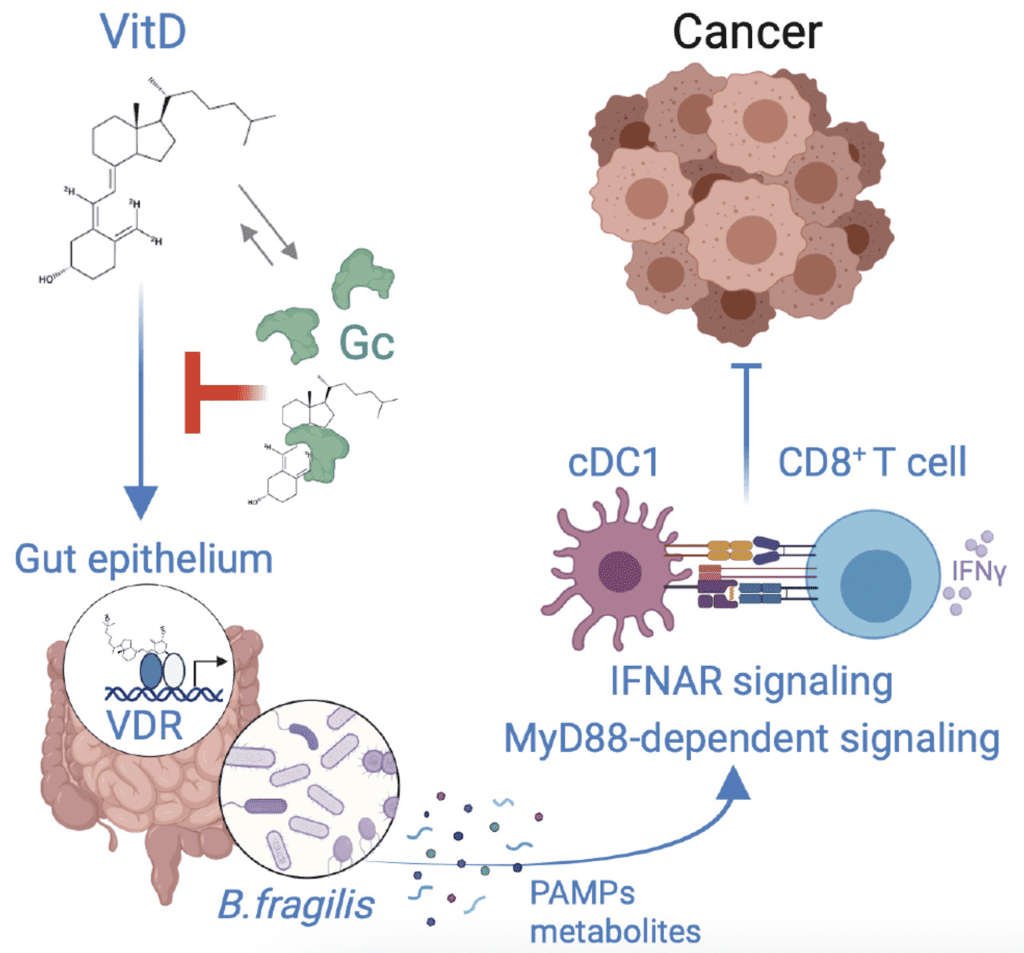The Gut Microbiome promotes Cancer Immunity under Vitamin D Availability
Dr Evangelos Giampazolias, head of our Cancer Immunosurveillance Group, recently spoke to BBC Science Focus about his research showing that the gut microbiome promotes immunity to cancer through a mechanism dependent on the availability of Vitamin D.
This work, published in the journal Science, showed that that vitamin D bioavailability in mice influences the anti-tumour activity of the gut microbiome. After dietary manipulation, vitamin D levels were observed to affect gut bacteria, which in turn improved cancer immunotherapy and antitumor immunity.
In humans, low vitamin D levels were correlated with tumor development, and gene signatures of vitamin D activity were associated with improved patient responses to immunotherapy.
Speaking to the BBC, Dr Giampazolias said “We find that mice lacking a protein known as Gc globulin show enhanced immunity to cancer and increased responses to immunotherapy.”
Drawing on the evidence from previous studies, Evangelos identified that Gc globulin binds to vitamin D in the blood and keeps it away from tissues. This led them to speculate that increased availability of vitamin D in tissues could somehow enhance immunity to cancer.
Not only were mice fed a vitamin D-rich diet better able to fight cancer, those mice were also able to transmit immunity to cancer through their faecal matter to other mice. (Mice are naturally coprophagic, that is they consume faecal matter to extract more nutrition from their waste.)
As discussed in the BBC article, Evangelos found that it wasn’t vitamin D itself that protected mice against cancer, but instead it played a critical role in altering the gut microbiome (friendly microorganisms in the gut of mice), which allowed them to boost their immune responses to tumours.
Translating these findings into patient benefit, and understanding more of this link between the microbiome and immune responses to cancer is what the Cancer Immunosurveillance team are now working on. Early findings related to patients are promising. In a dataset from 1.5 million people in Denmark they found a correlation between lower vitamin D levels in the blood and a higher risk of developing cancer.
In another cohort of cancer patients, there are indications that higher vitamin D levels correlated with a better response to immune-based cancer treatments. But it is still early days and further research needs to be done.
Dr Evangelos Giampazolias
Cancer Research UK Manchester Institute Group Leader
“We were really intrigued. We wanted to find this magic trait of cancer resistance that can be passed from one mouse to the other. One of the main things that came to our minds is that faecal matter is a big source of communities of friendly microorganisms that live inside the gut.”
Dr Evangelos Giampazolias
Cancer Research UK Manchester Institute Group Leader

You can read the full article “Vitamin D: How much your body actually needs (and how to get it)” on the BBC Science Focus website: https://www.sciencefocus.com/the-human-body/vitamin-d-how-to-get

Our vision for world leading cancer research in the heart of Manchester
We are a leading cancer research institute within The University of Manchester, spanning the whole spectrum of cancer research – from investigating the molecular and cellular basis of cancer, to translational research and the development of therapeutics.
Our collaborations
Bringing together internationally renowned scientists and clinicians
Scientific Advisory Board
Supported by an international Scientific Advisory Board




